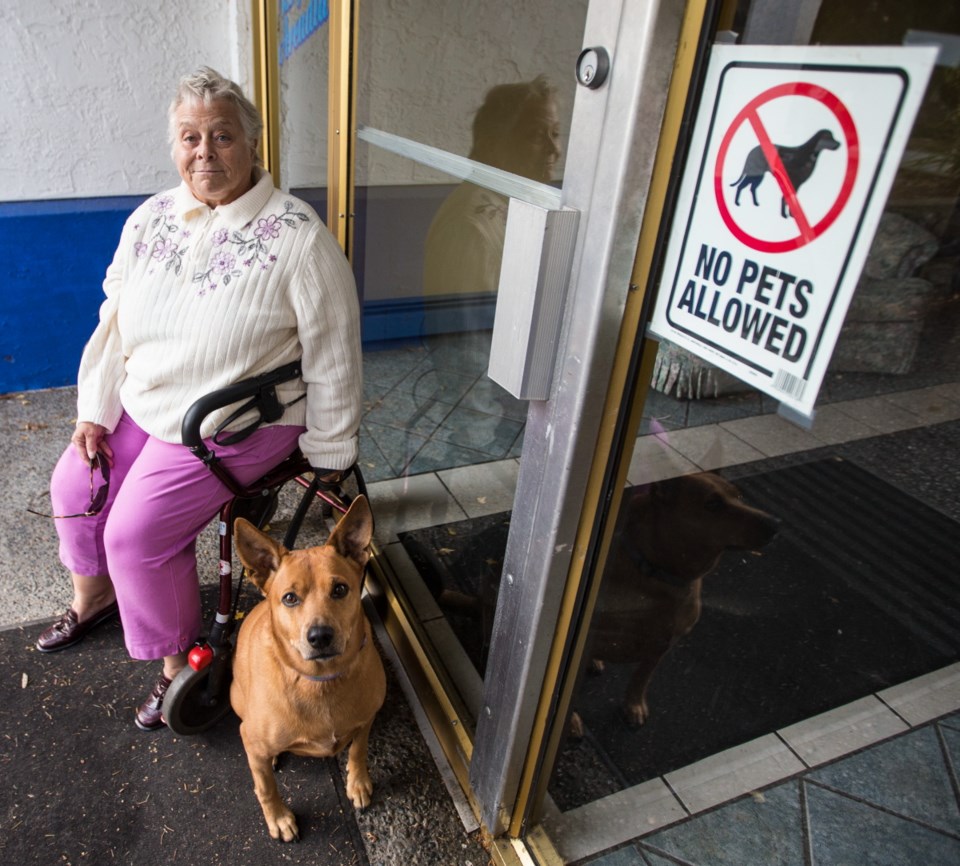Esquimalt resident Rosemary Collins is frustrated with a choice that seems increasingly common: affordable housing or keeping her dog.
At 70, Collins says her rent is eating up her retirement income, but she doesn’t want to surrender her seven-year-old Australian kelpie, Tipper, to move to a more affordable place.
“It’s a struggle. It’s a struggle every single month,” Collins said. “But she’s my exercise therapy dog, she’s kept me out of a wheelchair until now.”
Collins is among a group of citizens calling on Housing Minister Selina Robinson to change the Residential Tenancy Act to eliminate the “no-pets” policy.
According to the act, a landlord can prohibit pets or restrict them based on size, kind or number, plus identify a tenant’s obligations in respect to keeping the pet on the property.
A landlord can also collect a pet damage deposit.
Collins considers herself lucky to have gotten into her current apartment two months before the landlord put a no-pets policy into effect for new tenants. But at $800, her rent eats up almost half of her $1,800 monthly retirement income, so she put her name on a list for subsidized housing.
When she got to the top, she was told the available space only allows official therapy dogs.
She declined.
“It’s been an uphill battle all the way. And it’s gotten considerably worse because of the housing shortage right now and because the rents are so high,” Collins said. “People like me, who are now in retirement, are really having a difficult time.”
The B.C. SPCA says Collins isn’t alone in her decision.
Of the 8,035 pets surrendered last year, 1,774 were given up for housing-related reasons.
There are nearly five housing-related surrenders per day in B.C., said Amy Morris, the organization’s manager, public policy and outreach.
Those figures don’t include pets that are abandoned at a property when someone moves, she said.
While Morris didn’t have provincewide figures available, she said Vancouver saw a 127 per cent increase in housing-related pet surrenders between 2013 and 2015.
On Sunday at 12:30 p.m., a group called Pets OK B.C. will host a rally at the B.C. legislature lawn, calling on Robinson to change the rules.
The group has collected 10,000 signatures on a petition calling for changes to the Residential Tenancy Act that would nullify no-pets policies and require an individualized process that doesn’t “indiscriminately penalizing all families with pets.”
Ontario adopted similar legislation 27 years ago.
“The no-pet policy is a very broad-stroke policy that, unfortunately, discriminates against people who are responsible pet guardians,” said Jordan Reichert, a member of Pets OK B.C.
“Right now, any landlord can have a no-pet policy, whether or not there’s any rationale behind that. Similarly, if a landlord or property management company decides they want to impose a no-pet policy without there being a specific cause or incident to refence, they’re legally entitled to do that.”
Landlords should still be able to ban pets under certain circumstances, such as when there are concerns about allergies or safety, or there has been evidence of property damage, Reichert said.
“Affordable housing is already extremely difficult to find across B.C. and Victoria, so this is a further barrier to housing that is just unjustified,” he said.
But David Hutniak, CEO of LandlordBC, said there are good reasons for the no-pet clause.
Landlords have a responsibility to provide tenants with “quiet enjoyment” of their property, which isn’t specific to noise.
“It applies to everything: Tenants who may have allergies, fear of pets, who find the whole sort of ambiance on the front lawn [with a pet] less than to their satisfaction,” Hutniak said.
“If we don’t deliver that as landlords, they have a right to dispute that.”
Hutniak said the pet damage deposit rarely covers the actual cost of damage caused by pets and as property owners of market-level rentals, landlords have a right to decide if they want to take on pets or not.
“We feel strongly we should have the right to determine whether or not we want our building to be pet friendly,” he said.
Many properties do allow pets and many rental buildings in development will be pet-friendly, he said. It might mean higher rent, however, as landlords can include anticipated costs in determining rent.
Robinson said any changes would require consultation with landlord and tenant groups to balance needs.
“That’s certainly a conversation we need to have with this group, I’m prepared to do that, as well as with landlords,” she said.
But she said that already happened in 2004, which resulted in the ability for landlords to levy a “pet deposit.” She said the changes encouraged landlords to allow pets.
The real problem, she said, isn’t pet policies but housing supply.
“We need to get more stock — when we have a bigger vacancy rate, there’s more room for people to move. But because it’s such a tight market, it’s become much harder, because of the selectivity of landlords,” Robinson said.



